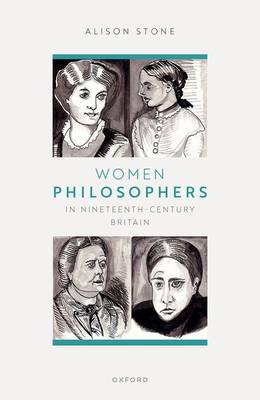
Door een staking bij bpost kan je online bestelling op dit moment iets langer onderweg zijn dan voorzien. Dringend iets nodig? Onze winkels ontvangen jou met open armen!
- Afhalen na 1 uur in een winkel met voorraad
- Gratis thuislevering in België vanaf € 30
- Ruim aanbod met 7 miljoen producten
Door een staking bij bpost kan je online bestelling op dit moment iets langer onderweg zijn dan voorzien. Dringend iets nodig? Onze winkels ontvangen jou met open armen!
- Afhalen na 1 uur in een winkel met voorraad
- Gratis thuislevering in België vanaf € 30
- Ruim aanbod met 7 miljoen producten
Zoeken
€ 134,45
+ 268 punten
Omschrijving
Many women wrote philosophy in nineteenth-century Britain, and they wrote across the full range of philosophical topics. Yet these important women thinkers have been left out of the philosophical canon and many of them are barely known today. The aim of this book is to put them back on the map. It introduces twelve women philosophers - Mary Shepherd, Harriet Martineau, Ada Lovelace, George Eliot, Frances Power Cobbe, Helena Blavatsky, Julia Wedgwood, Victoria Welby, Arabella Buckley, Annie Besant, Vernon Lee, and Constance Naden. Alison Stone looks at their views on naturalism, philosophy of mind, evolution, morality and religion, and progress in history. She shows how these women interacted and developed their philosophical views in conversation with one another, not only with their male contemporaries. The rich print and periodical culture of the period enabled these women to publish philosophy in forms accessible to a general readership, despite the restrictions women faced, such as having limited or no access to university education. Stone explains how these women became excluded from the history of philosophy because there was a cultural shift at the end of the nineteenth century towards specialised forms of philosophical writing, which depended on academic credentials that were still largely unavailable to women.
Specificaties
Betrokkenen
- Auteur(s):
- Uitgeverij:
Inhoud
- Aantal bladzijden:
- 304
- Taal:
- Engels
Eigenschappen
- Productcode (EAN):
- 9780192874719
- Verschijningsdatum:
- 13/04/2023
- Uitvoering:
- Hardcover
- Formaat:
- Genaaid
- Afmetingen:
- 163 mm x 221 mm
- Gewicht:
- 589 g

Alleen bij Standaard Boekhandel
+ 268 punten op je klantenkaart van Standaard Boekhandel
Beoordelingen
We publiceren alleen reviews die voldoen aan de voorwaarden voor reviews. Bekijk onze voorwaarden voor reviews.











